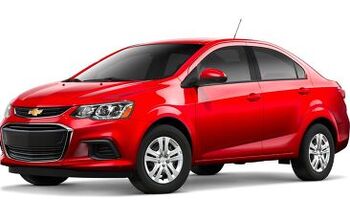Chevrolet Sonic Stages a Reappearance for 2019

Here today, gone tomorrow, back the next day. That’s basically the recent history of the Chevrolet Sonic, which formed the basis of a Wall Street Journal report earlier this spring. Chevrolet’s subcompact hatch and sedan could end production by the end of the year, the report stated, and the model’s subsequent disappearance from a 2019 model year California Air Resources Board certification document only added fuel to the rumor fire.
We reached out to GM about the Sonic’s CARB vanishing act, but never heard back. Now, the Michigan-built model has reappeared, promising a 2019 model year model for subcompact buyers.
An updated emissions document, dated April 30th, shows both sedan and hatch variants of the Sonic listed alongside other 1.4-liter GM models, including the all-wheel-drive Chevrolet Trax missing from the earlier doc.
The Sonic shares factory space with the Chevrolet Bolt at GM’s Orion Assembly plant. It’s believed GM wants that space for the production of Bolt variants and perhaps other electric models, as well as autonomous cars. The automaker recently invested $100 million to support next year’s production of the Cruise AV — essentially a Bolt without a steering wheel.
While the WSJ report could indeed prove true, GM remains tight-lipped as to the model’s future. It could easily stop production at the end of the year, allowing for a run of 2019 models, or continue onward until its assembly space becomes too valuable for a low-margin vehicle.
Last year, Sonic sales in the U.S. dropped to less than a third of the model’s 2014 volume of 93,518 vehicles. We don’t have a tally for last month; blame GM’s decision to switch to quarterly sales reports. The first quarter of 2018, however, saw the Sonic drop 21.5 percent compared to Q1 2017.
[Image: General Motors]

More by Steph Willems
Latest Car Reviews
Read moreLatest Product Reviews
Read moreRecent Comments
- Theflyersfan The wheel and tire combo is tragic and the "M Stripe" has to go, but overall, this one is a keeper. Provided the mileage isn't 300,000 and the service records don't read like a horror novel, this could be one of the last (almost) unmodified E34s out there that isn't rotting in a barn. I can see this ad being taken down quickly due to someone taking the chance. Recently had some good finds here. Which means Monday, we'll see a 1999 Honda Civic with falling off body mods from Pep Boys, a rusted fart can, Honda Rot with bad paint, 400,000 miles, and a biohazard interior, all for the unrealistic price of $10,000.
- Theflyersfan Expect a press report about an expansion of VW's Mexican plant any day now. I'm all for worker's rights to get the best (and fair) wages and benefits possible, but didn't VW, and for that matter many of the Asian and European carmaker plants in the south, already have as good of, if not better wages already? This can drive a wedge in those plants and this might be a case of be careful what you wish for.
- Jkross22 When I think about products that I buy that are of the highest quality or are of great value, I have no idea if they are made as a whole or in parts by unionized employees. As a customer, that's really all I care about. When I think about services I receive from unionized and non-unionized employees, it varies from C- to F levels of service. Will unionizing make the cars better or worse?
- Namesakeone I think it's the age old conundrum: Every company (or industry) wants every other one to pay its workers well; well-paid workers make great customers. But nobody wants to pay their own workers well; that would eat into profits. So instead of what Henry Ford (the first) did over a century ago, we will have a lot of companies copying Nike in the 1980s: third-world employees (with a few highly-paid celebrity athlete endorsers) selling overpriced products to upper-middle-class Americans (with a few urban street youths willing to literally kill for that product), until there are no more upper-middle-class Americans left.
- ToolGuy I was challenged by Tim's incisive opinion, but thankfully Jeff's multiple vanilla truisms have set me straight. Or something. 😉


































Comments
Join the conversation
For a moment there I had hope that we'd get the correct class size car from rental companies when we reserve them, but apparently that will have to wait at least another year.
That’s great news. I love my little Sonic hatchback and despite being a seven year old design, still holds its own against its competitors. Compared to their previous subcompact offerings, GM really tried hard on this one to make a fun, livable, and quirky little car